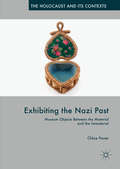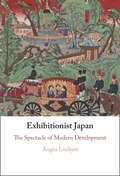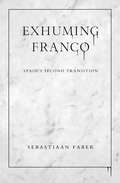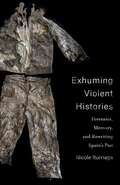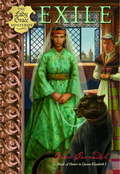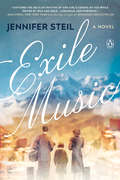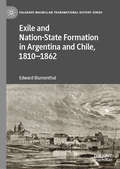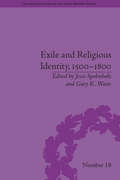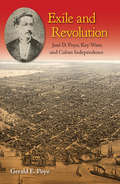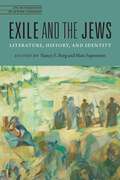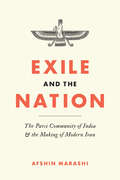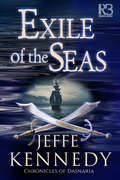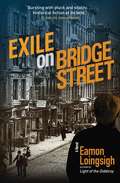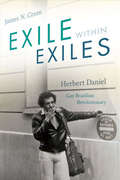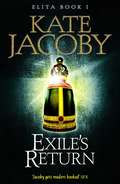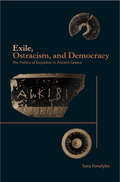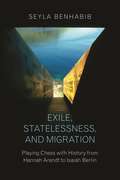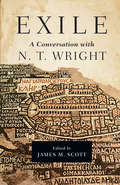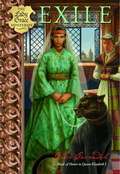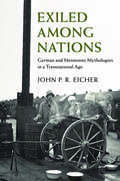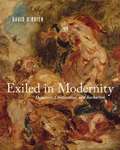- Table View
- List View
Exhibiting the Nazi Past: Museum Objects Between the Material and the Immaterial (The Holocaust and its Contexts)
by Chloe PaverThis book is the first full-length study of the museum object as a memory medium in history exhibitions about the Nazi era, the Second World War, and the Holocaust. Over recent decades, German and Austrian exhibition-makers have engaged in significant programmes of object collection, often in collaboration with witnesses and descendants. At the same time, exhibition-makers have come to recognise the degree to which the National Socialist era was experienced materially, through the loss, acquisition, imposition, destruction, and re-purposing of objects. In the decades after 1945, encounters with material culture from the Nazi past continued, both within the family and in the public sphere. In analysing how these material engagements are explored in the museum, the book not only illuminates a key aspect of German and Austrian cultural memory but contributes to wider debates about relationships between the human and object worlds.
Exhibitionist Japan: The Spectacle of Modern Development
by Angus LockyerFrom the second half of the nineteenth century, Japan has been a particularly enthusiastic user of exhibitions. Large-scale international exhibitions, including Osaka 2025, form only the tip of an iceberg comprising over 1,300 industrial, regional, and local exhibitions held in Japan over the past 150 years. In this unique history, Angus Lockyer explores how and why these events have been used as catalysts of development and arenas for fostering modern industry, empire, and nation. He traces their complicated genesis, realization, and reception, demonstrating that although they rarely achieve their stated aims, this does not undermine their utility – Japanese expos have provided a model subsequently adopted around the world. The history of this enthusiasm provides a more nuanced understanding of development in modern Japan, and emphasizes the shared experiences of global modernity.
Exhuming Franco: Spain's Second Transition, Second Edition
by Sebastiaan FaberThrough dozens of interviews, intensive reporting, and deep research and analysis, Sebastiaan Faber sets out to understand what remains of Francisco Franco's legacy in Spain today. Faber's work is grounded in heavy scholarship, but the book is an engaging, accessible introduction to a national conversation about fascism. Spurred by the disinterment of the dictator in 2019, Faber finds that Spain is still deeply affected—and divided—by the dictatorial legacies of Francoism. This new edition, with additional interviews and a new introduction, illuminates the dangers of the rise of right-wing nationalist revisionism by using Spain as a case study for how nations face, or don't face, difficult questions about their past.
Exhuming Violent Histories: Forensics, Memory, and Rewriting Spain’s Past
by Nicole IturriagaMany years after the fall of Franco’s regime, Spanish human rights activists have turned to new methods to keep the memory of state terror alive. By excavating mass graves, exhuming remains, and employing forensic analysis and DNA testing, they seek to provide direct evidence of repression and break through the silence about the dictatorship’s atrocities that persisted well into Spain’s transition to democracy.Nicole Iturriaga offers an ethnographic examination of how Spanish human rights activists use forensic methods to challenge dominant histories, reshape collective memory, and create new forms of transitional justice. She argues that by grounding their claims in science, activists can present themselves as credible and impartial, helping them intervene in fraught public disputes about the remembrance of the past. The perceived legitimacy and authenticity of scientific techniques allows their users to contest the state’s historical claims and offer new narratives of violence in pursuit of long-delayed justice.Iturriaga draws on interviews with technicians and forensics experts and provides a detailed case study of Spain’s best-known forensic human rights organization, the Association for the Recovery of Historical Memory. She also considers how the tools and tactics used in Spain can be adopted by human rights and civil society groups pursuing transitional justice in other parts of the world. An ethnographically rich account, Exhuming Violent Histories sheds new light on how science and technology intersect with human rights and collective memory.
Exile
by Jakob EjersboFor the vagabond pack of ex-pat Europeans, Indian Tanzanians and wealthy Africans at Moshi's International School, it's all about getting high, getting drunk and getting laid. Their parents - drug dealers, mercenaries and farmers gone to seed - are too dead inside to give a damn. Outwardly free but empty at heart, privileged but out of place, these kids are lost, trapped in a land without hope. They can try to get out, but something will always drag them back - where can you go when you believe in nothing and belong to nowhere? Exile is the first of three powerful novels about growing up as an ex-pat in Tanzania. Ejersbo's first novel, Nordkraft, the Danish Trainspotting, was a phenomenal bestseller. Ejersbo's trilogy, only published after his death in 2008, has proved to be another cult and critical sensation.
Exile (Lady Grace Mysteries #5)
by Grace CavendishThere's a new arrival--a mysterious and exotic young princess--at Court and Lady Grace can't believe how many rumours there are about her already. The exiled Banoo Yasmine from Sharakand is a beautiful girl with a pet panther and, everyone believes, magical powers. Yasmine also possesses the renowned Heart of Kings Ruby, a huge stone that she wears around her neck to balls and feasts, that legend says has the power to make kings. When the famed jewel goes missing, the finger is pointed at Grace's dear friend Ellie the laundry maid. Grace must prove her friend's innocence, find the true thief, and restore the stone to its rightful owner.
Exile (The Africa Trilogy)
by Jakob EjersboFor the vagabond pack of ex-pat Europeans, Indian Tanzanians and wealthy Africans at Moshi's International School, it's all about getting high, getting drunk and getting laid. Their parents - drug dealers, mercenaries and farmers gone to seed - are too dead inside to give a damn. Outwardly free but empty at heart, privileged but out of place, these kids are lost, trapped in a land without hope. They can try to get out, but something will always drag them back - where can you go when you believe in nothing and belong to nowhere? Exile is the first of three powerful novels about growing up as an ex-pat in Tanzania. Ejersbo's first novel, Nordkraft, the Danish Trainspotting, was a phenomenal bestseller. Ejersbo's trilogy, only published after his death in 2008, has proved to be another cult and critical sensation.
Exile Music: A Novel
by Jennifer SteilBased on an unexplored slice of World War II history, Exile Music is the captivating story of a young Jewish girl whose family flees refined and urbane Vienna for safe harbor in the mountains of BoliviaAs a young girl growing up in Vienna in the 1930s, Orly has an idyllic childhood filled with music. Her father plays the viola in the Philharmonic, her mother is a well-regarded opera singer, her beloved and charismatic older brother holds the neighborhood in his thrall, and most of her eccentric and wonderful extended family live nearby. Only vaguely aware of Hitler's rise or how her Jewish heritage will define her family's identity, Orly spends her days immersed in play with her best friend and upstairs neighbor, Anneliese. Together they dream up vivid and elaborate worlds, where they can escape the growing tensions around them.But in 1938, Orly's peaceful life is shattered when the Germans arrive. Her older brother flees Vienna first, and soon Orly, her father, and her mother procure refugee visas for La Paz, a city high up in the Bolivian Andes. Even as the number of Jewish refugees in the small community grows, her family is haunted by the music that can no longer be their livelihood, and by the family and friends they left behind. While Orly and her father find their footing in the mountains, Orly's mother grows even more distant, harboring a secret that could put their family at risk again. Years pass, the war ends, and Orly must decide: Is the love and adventure she has found in La Paz what defines home, or is the pull of her past in Europe--and the piece of her heart she left with Anneliese--too strong to ignore?
Exile and Nation-State Formation in Argentina and Chile, 1810–1862 (Palgrave Macmillan Transnational History Series)
by Edward BlumenthalThis book traces the impact of exile in the formation of independent republics in Chile and the Río de la Plata in the decades after independence. Exile was central to state and nation formation, playing a role in the emergence of territorial borders and Romantic notions of national difference, while creating a transnational political culture that spanned the new independent nations. Analyzing the mobility of a large cohort of largely elite political émigrés from Chile and the Río de la Plata across much of South America before 1862, Edward Blumenthal reinterprets the political thought of well-known figures in a transnational context of exile. As Blumenthal shows, exile was part of a reflexive process in which elites imagined the nation from abroad while gaining experience building the same state and civil society institutions they considered integral to their republican nation-building projects.
Exile and Religious Identity, 1500–1800 (Religious Cultures in the Early Modern World #18)
by Gary K WaiteExile was a central feature of society throughout the early modern world. For this reason the contributors to this volume see exile as a critical framework for analysing and understanding society at this time.
Exile and Revolution: José D. Poyo, Key West, and Cuban Independence
by Gerald E. PoyoJosé Dolores Poyo (1836-1911) was an activist, publisher, social critic, fundraiser, and foundational figure in the campaign for Cuban independence from Spain. His leadership and his mantra-"adelante la revolución" (forward the revolution)-mobilized an insurrectionist movement in Key West. His multidimensional grassroots work and his newspaper El Yara, the longest-lived Cuban exile newspaper of the nineteenth century, gave hope to a people who aspired to be liberated from the bonds of colonialism. In Exile and Revolution, Gerald Poyo provides a comprehensive account of how his great-great-grandfather spurred the working-class community of Key West to transform their roles as supporting cast to become critical actors in the struggle for Cuban independence. The book reveals the depth of Cuba’s longtime ties to Florida, the cigar industry, and its workers; the experience of Cubans in the American South; and the diplomatic intrigues involving Spain, Cuba, and the United States.
Exile and the Jews: Literature, History, and Identity (JPS Anthologies of Jewish Thought)
by Marc Saperstein Nancy E. BergThis first comprehensive anthology examining Jewish responses to exile from the biblical period to our modern day gathers texts from all genres of Jewish literary creativity to explore how the realities and interpretations of exile have shaped Judaism, Jewish politics, and individual Jewish identity for millennia. Ordered along multiple arcs—from universal to particular, collective to individual, and mythic-symbolic to prosaic everyday living—the chapters present different facets of exile: as human condition, in history and life, in holiday rituals, in language, as penance and atonement, as internalized experience, in relation to the Divine Presence, and more. By illuminating the multidimensional nature of &“exile&”—political, philosophical, religious, psychological, and mythological—widely divergent evaluations of Jewish life in the Diaspora emerge. The word &“exile&” and its Hebrew equivalent, galut, evoke darkness, bleakness—and yet the condition offers spiritual renewal and engenders great expressions of Jewish cultural creativity: the Babylonian Talmud, medieval Jewish philosophy, golden age poetry, and modern Jewish literature.Exile and the Jews will engage students, academics, and general readers in contemplating immigration, displacement, evolving identity, and more.
Exile and the Nation: The Parsi Community of India & the Making of Modern Iran
by Afshin Marashi&“Groundbreaking. . . . There is little doubt [this book] will become foundational reading for any student of Iranian modernity and nationalism.&” —Diaspora: A Journal of Transnational Studies In the aftermath of the seventh-century Islamic conquest of Iran, Zoroastrians departed for India. Known as the Parsis, they slowly lost contact with their ancestral land until the nineteenth century, when steam-powered sea travel, the increased circulation of Zoroastrian-themed books, and the philanthropic efforts of Parsi benefactors sparked a new era of interaction between the two groups. Tracing the cultural and intellectual exchange between Iranian nationalists and the Parsi community during the late nineteenth and early twentieth centuries, Exile and the Nation shows how this interchange led to the collective reimagining of Parsi and Iranian national identity—and the influence of antiquity on modern Iranian nationalism, which previously rested solely on European forms of thought. Iranian nationalism, Afshin Marashi argues, was also the byproduct of the complex history resulting from the demise of the early modern Persianate cultural system, as well as one of the many cultural heterodoxies produced within the Indian Ocean world. Crossing the boundaries of numerous fields of study, this book reframes Iranian nationalism within the context of the connected, transnational, and global history of the modern era. &“Well-written, clearly argued . . . Transnational history at its best.&” —Middle East Journal [Marashi&’s] engaging biographies . . . highlight . . . the significance of Parsi Zoroastrians to the related restoration of &‘Iranian authenticity.&’&” —Journal of Asian Studies &“A richly textured study.&” ―Peyk Magazine &“Exile and the Nation is as important a contribution to colonial Indian history as it is to understanding the origins of the modern Middle East.&” ―Los Angeles Review of Books
Exile of the Seas (Chronicles of Dasnaria #2)
by Jeffe KennedyAround the shifting borders of the Twelve Kingdoms, trade and conflict, danger and adventure put every traveler on guard . . . but some have everything to lose. ESCAPED Once she was known as Jenna, Imperial Princess of Dasnaria, schooled in graceful dance and comely submission. Until the man her parents married her off to almost killed her with his brutality. Now, all she knows is that the ship she’s boarded is bound away from her vicious homeland. The warrior woman aboard says Jenna’s skill in dancing might translate into a more lethal ability. Danu’s fighter priestesses will take her in, disguise her as one of their own—and allow her to keep her silence. But it’s only a matter of time until Jenna’s monster of a husband hunts her down. Her best chance to stay hidden is to hire out as bodyguard to a caravan traveling to a far-off land, home to beasts and people so unfamiliar they seem like part of a fairy tale. But her supposed prowess in combat is a fraud. And sooner or later, Jenna’s flight will end in battle—or betrayal . . .
Exile on Bridge Street: A Novel
by Eamon LoingsighExile on Bridge Street details teenage Irish immigrant Liam Garrity's struggle to adulthood in pre-Prohibition Brooklyn. Back home, Ireland's fight for its own independence erupts with the 1916 Easter Rising. The fate of Garrity's father, an Irish rebel, is unknown, which leaves his mother and two sisters vulnerable on the family farm as British troops swarm, seeking reprisals. Garrity must organize their departure to New York immediately. In Brooklyn, Garrity is adopted by Dinny Meehan, leader of a longshoremen gang based in an "Irishtown" saloon under the Manhattan and Brooklyn bridges. Meehan vows to help Garrity and his family. But just as Ireland struggles for independence, Garrity faces great obstacles in his own coming of age on the violent Brooklyn waterfront. World War I, the Spanish Influenza, the temperance movement, the rise of Italian organized crime, police, unions and shipping and dock companies all target the Brooklyn Irish gang and threaten Garrity's chances at bringing his family to New York. When "Wild Bill" Lovett, one of the gang's dockbosses vies to take over, both Meehan and Garrity face a fight for survival in New York City's brawling streets mirroring Ireland's own fledgling independence movement. Compelling writing by a master of historical fiction, as evidenced in the authors critically-acclaimed prequel Light of the Diddicoy.
Exile within Exiles: Herbert Daniel, Gay Brazilian Revolutionary
by James N. GreenHerbert Daniel was a significant and complex figure in Brazilian leftist revolutionary politics and social activism from the mid-1960s until his death in 1992. As a medical student, he joined a revolutionary guerrilla organization but was forced to conceal his sexual identity from his comrades, a situation Daniel described as internal exile. After a government crackdown, he spent much of the 1970s in Europe, where his political self-education continued. He returned to Brazil in 1981, becoming engaged in electoral politics and social activism to champion gay rights, feminism, and environmental justice, achieving global recognition for fighting discrimination against those with HIV/AIDS. In Exile within Exiles, James N. Green paints a full and dynamic portrait of Daniel's deep commitment to leftist politics, using Daniel's personal and political experiences to investigate the opposition to Brazil's military dictatorship, the left's construction of a revolutionary masculinity, and the challenge that the transition to democracy posed to radical movements. Green positions Daniel as a vital bridge linking former revolutionaries to the new social movements, engendering productive dialogue between divergent perspectives in his writings and activism.
Exile's Return (The Books of Elita)
by Kate JacobyIn a land filled with turmoil, an exile and an orphan become caught in a prophecy older than time itself. Robert Douglas, Earl of Dunlorn, returns to Lusara after three years only to find his country caught in the tyranny of the Guilde. And, even as the vanquished people cry out for a savior, other cataclysmic events unfold--events that will determine the fate not only of Lusara, but of the whole world. Robert, who possesses magical power greater than any before him, must now make a choice: to remain true to his vow never to oppose the usurper king or break his promise, assume responsibility, and save his beloved homeland. Then he and his brother rescue the orphan Jenn and discover in her a new kind of sorcerer--one whose talents may be as great as Robert's. And, with Jenn come new possibilities.
Exile, Ostracism, and Democracy: The Politics of Expulsion in Ancient Greece
by Sara ForsdykeThis book explores the cultural and political significance of ostracism in democratic Athens. In contrast to previous interpretations, Sara Forsdyke argues that ostracism was primarily a symbolic institution whose meaning for the Athenians was determined both by past experiences of exile and by its role as a context for the ongoing negotiation of democratic values. The first part of the book demonstrates the strong connection between exile and political power in archaic Greece. In Athens and elsewhere, elites seized power by expelling their rivals. Violent intra-elite conflict of this sort was a highly unstable form of "politics that was only temporarily checked by various attempts at elite self-regulation. A lasting solution to the problem of exile was found only in the late sixth century during a particularly intense series of violent expulsions. At this time, the Athenian people rose up and seized simultaneously control over decisions of exile and political power. The close connection between political power and the power of expulsion explains why ostracism was a central part of the democratic reforms. Forsdyke shows how ostracism functioned both as a symbol of democratic power and as a key term in the ideological justification of democratic rule. Crucial to the author's interpretation is the recognition that ostracism was both a remarkably mild form of exile and one that was infrequently used. By analyzing the representation of exile in Athenian imperial decrees, in the works of Herodotus, Thucydides, Plato, Aristotle, and in tragedy and oratory, Forsdyke shows how exile served as an important term in the debate about the best form of rule.
Exile, Statelessness, and Migration: Playing Chess with History from Hannah Arendt to Isaiah Berlin
by Seyla BenhabibAn examination of the intertwined lives and writings of a group of prominent twentieth-century Jewish thinkers who experienced exile and migrationExile, Statelessness, and Migration explores the intertwined lives, careers, and writings of a group of prominent Jewish intellectuals during the mid-twentieth century—in particular, Theodor Adorno, Hannah Arendt, Walter Benjamin, Isaiah Berlin, Albert Hirschman, and Judith Shklar, as well as Hans Kelsen, Emmanuel Levinas, Gershom Scholem, and Leo Strauss. Informed by their Jewish identity and experiences of being outsiders, these thinkers produced one of the most brilliant and effervescent intellectual movements of modernity.Political philosopher Seyla Benhabib’s starting point is that these thinkers faced migration, statelessness, and exile because of their Jewish origins, even if they did not take positions on specifically Jewish issues personally. The sense of belonging and not belonging, of being “eternally half-other,” led them to confront essential questions: What does it mean for the individual to be an equal citizen and to wish to retain one’s ethnic, cultural, and religious differences, or perhaps even to rid oneself of these differences altogether in modernity? Benhabib isolates four themes in their works: dilemmas of belonging and difference; exile, political voice, and loyalty; legality and legitimacy; and pluralism and the problem of judgment.Surveying the work of influential intellectuals, Exile, Statelessness, and Migration recovers the valuable plurality of their Jewish voices and develops their universal insights in the face of the crises of this new century.
Exile, Writer, Soldier, Spy: Jorge Semprún
by Soledad Fox MauraIn this gripping, authoritative biography, Soledad Fox Maura reveals the tumultuous true-life story of the Oscar-nominated screenwriter responsible for Z and The War Is Over.A man of many faces, Jorge Semprún perfectly personified the struggles and successes of twentieth-century Europe. Semprún enjoyed a privileged childhood as the grandson of Spanish prime minister, Antonio Maura, until his world was shattered by the political strife of the Spanish Civil War and he went into exile. Facing dangers rarely seen outside the action movies of Hollywood, Semprún adopted a resilient spirit and rebel’s stance. He fought with the French Resistance in World War II and survived imprisonment at Buchenwald. After the war, he became an organizing member of the exiled Spanish communist party, maintaining the appearance of a normal civilian life while keeping one step ahead of Francisco Franco's secret police for years. Semprún later put his experiences on paper, becoming an internationally acclaimed author and screenwriter.In this skillfully crafted biography, Semprún's life reads as easily as the best thriller, and has the same addictive rush as watching an edge-of-your-seat mini-series.
Exile: Old Testament, Jewish, And Christian Conceptions (Supplements To The Journal For The Study Of Judaism Ser. #Vol. 56)
by James M. ScottExile: A Conversation with N. T. Wright
Exile: The Lady Grace Mysteries, Book 5
by Jan Burchett Sara VoglerThief! When a visiting princess's priceless ruby goes missing, Ellie the laundrymaid is accused of the crime. Will Grace be able to prove her friend's innocence, find the true thief, and restore the stone to its rightful owner? Read the daybooke of Lady Grace, Queen Elizabeth's favorite Maid of Honour, for a mysterious story of jewels and magical powers.
Exiled Among Nations: German and Mennonite Mythologies in a Transnational Age (Publications of the German Historical Institute)
by John P. EicherHow do groups of people fashion shared identities in the modern world? Following two communities of German-speaking Mennonites, one composed of voluntary migrants and the other of refugees, across four continents between 1870 and 1945, this transnational study explores how religious migrants engaged with the phenomenon of nationalism. John P. R. Eicher demonstrates how migrant groups harnessed the global spread of nationalism to secure practical objectives and create local mythologies. In doing so, he also reveals how governments and aid organizations used diasporic groups for their own purposes - and portraying such nomads as enemies or heroes in national and religious mythologies. By underscoring the importance of local and religious counter-stories that run in parallel to nationalist narratives, Exiled Among Nations helps us understand acts of resistance, flight, and diaspora in the modern world.
Exiled in Modernity: Delacroix, Civilization, and Barbarism
by David O'BrienNotions of civilization and barbarism were intrinsic to Eugène Delacroix’s artistic practice: he wrote regularly about these concepts in his journal, and the tensions between the two were the subject of numerous paintings, including his most ambitious mural project, the ceiling of the Library of the Chamber of Deputies in the Palais Bourbon. Exiled in Modernity delves deeply into these themes, revealing why Delacroix’s disillusionment with modernity increasingly led him to seek spiritual release or epiphany in the sensual qualities of painting. <p><p> While civilization implied a degree of control and the constraint of natural impulses for Delacroix, barbarism evoked something uncontrolled and impulsive. Seeing himself as part of a grand tradition extending back to ancient Greece, Delacroix was profoundly aware of the wealth and power that set nineteenth-century Europe apart from the rest of the world. Yet he was fascinated by civilization’s chaotic underbelly. In analyzing Delacroix’s art and prose, David O’Brien illuminates the artist’s effort to reconcile the erudite, tradition-bound aspects of painting with a desire to reach viewers in a more direct, unrestrained manner. <p> Focusing chiefly on Delacroix’s musings about civilization in his famous journal, his major mural projects on the theme of civilization, and the place of civilization in his paintings of North Africa and of animals, O’Brien links Delacroix’s increasingly pessimistic view of modernity to his desire to use his art to provide access to a more fulfilling experience.With more than one hundred illustrations, this original, astute analysis of Delacroix and his work explains why he became an inspiration for modernist painters over the half-century following his death. Art historians and scholars of modernism especially will find great value in O’Brien’s work.
Exiled in Modernity: Delacroix, Civilization, and Barbarism
by David O'BrienNotions of civilization and barbarism were intrinsic to Eugène Delacroix’s artistic practice: he wrote regularly about these concepts in his journal, and the tensions between the two were the subject of numerous paintings, including his most ambitious mural project, the ceiling of the Library of the Chamber of Deputies in the Palais Bourbon. Exiled in Modernity delves deeply into these themes, revealing why Delacroix’s disillusionment with modernity increasingly led him to seek spiritual release or epiphany in the sensual qualities of painting.While civilization implied a degree of control and the constraint of natural impulses for Delacroix, barbarism evoked something uncontrolled and impulsive. Seeing himself as part of a grand tradition extending back to ancient Greece, Delacroix was profoundly aware of the wealth and power that set nineteenth-century Europe apart from the rest of the world. Yet he was fascinated by civilization’s chaotic underbelly. In analyzing Delacroix’s art and prose, David O’Brien illuminates the artist’s effort to reconcile the erudite, tradition-bound aspects of painting with a desire to reach viewers in a more direct, unrestrained manner. Focusing chiefly on Delacroix’s musings about civilization in his famous journal, his major mural projects on the theme of civilization, and the place of civilization in his paintings of North Africa and of animals, O’Brien links Delacroix’s increasingly pessimistic view of modernity to his desire to use his art to provide access to a more fulfilling experience.With more than one hundred illustrations, this original, astute analysis of Delacroix and his work explains why he became an inspiration for modernist painters over the half-century following his death. Art historians and scholars of modernism especially will find great value in O’Brien’s work.
